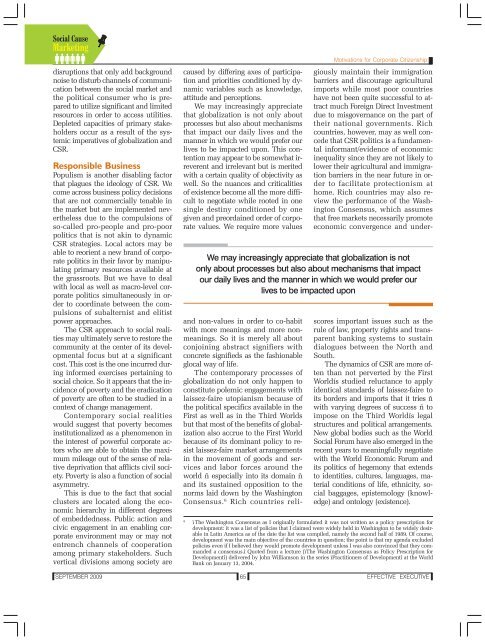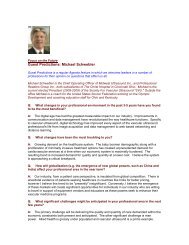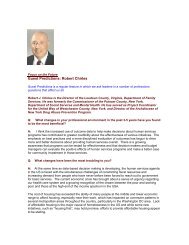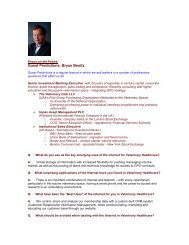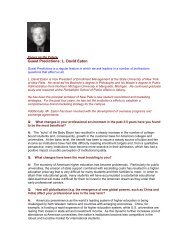Social Cause Marketing - The Regis Group Inc
Social Cause Marketing - The Regis Group Inc
Social Cause Marketing - The Regis Group Inc
You also want an ePaper? Increase the reach of your titles
YUMPU automatically turns print PDFs into web optimized ePapers that Google loves.
disruptions that only add background<br />
noise to disturb channels of communication<br />
between the social market and<br />
the political consumer who is prepared<br />
to utilize significant and limited<br />
resources in order to access utilities.<br />
Depleted capacities of primary stakeholders<br />
occur as a result of the systemic<br />
imperatives of globalization and<br />
CSR.<br />
Responsible Business<br />
Populism is another disabling factor<br />
that plagues the ideology of CSR. We<br />
come across business policy decisions<br />
that are not commercially tenable in<br />
the market but are implemented nevertheless<br />
due to the compulsions of<br />
so-called pro-people and pro-poor<br />
politics that is not akin to dynamic<br />
CSR strategies. Local actors may be<br />
able to reorient a new brand of corporate<br />
politics in their favor by manipulating<br />
primary resources available at<br />
the grassroots. But we have to deal<br />
with local as well as macro-level corporate<br />
politics simultaneously in order<br />
to coordinate between the compulsions<br />
of subalternist and elitist<br />
power approaches.<br />
<strong>The</strong> CSR approach to social realities<br />
may ultimately serve to restore the<br />
community at the center of its developmental<br />
focus but at a significant<br />
cost. This cost is the one incurred during<br />
informed exercises pertaining to<br />
social choice. So it appears that the incidence<br />
of poverty and the eradication<br />
of poverty are often to be studied in a<br />
context of change management.<br />
Contemporary social realities<br />
would suggest that poverty becomes<br />
institutionalized as a phenomenon in<br />
the interest of powerful corporate actors<br />
who are able to obtain the maximum<br />
mileage out of the sense of relative<br />
deprivation that afflicts civil society.<br />
Poverty is also a function of social<br />
asymmetry.<br />
This is due to the fact that social<br />
clusters are located along the economic<br />
hierarchy in different degrees<br />
of embeddedness. Public action and<br />
civic engagement in an enabling corporate<br />
environment may or may not<br />
entrench channels of cooperation<br />
among primary stakeholders. Such<br />
vertical divisions among society are<br />
caused by differing axes of participation<br />
and priorities conditioned by dynamic<br />
variables such as knowledge,<br />
attitude and perceptions.<br />
We may increasingly appreciate<br />
that globalization is not only about<br />
processes but also about mechanisms<br />
that impact our daily lives and the<br />
manner in which we would prefer our<br />
lives to be impacted upon. This contention<br />
may appear to be somewhat irreverent<br />
and irrelevant but is merited<br />
with a certain quality of objectivity as<br />
well. So the nuances and criticalities<br />
of existence become all the more difficult<br />
to negotiate while rooted in one<br />
single destiny conditioned by one<br />
given and preordained order of corporate<br />
values. We require more values<br />
We may increasingly appreciate that globalization is not<br />
only about processes but also about mechanisms that impact<br />
our daily lives and the manner in which we would prefer our<br />
lives to be impacted upon<br />
Motivations for Corporate Citizenship<br />
and non-values in order to co-habit<br />
with more meanings and more nonmeanings.<br />
So it is merely all about<br />
conjoining abstract signifiers with<br />
concrete signifieds as the fashionable<br />
glocal way of life.<br />
<strong>The</strong> contemporary processes of<br />
globalization do not only happen to<br />
constitute polemic engagements with<br />
laissez-faire utopianism because of<br />
the political specifics available in the<br />
First as well as in the Third Worlds<br />
but that most of the benefits of globalization<br />
also accrue to the First World<br />
because of its dominant policy to resist<br />
laissez-faire market arrangements<br />
in the movement of goods and services<br />
and labor forces around the<br />
world ñ especially into its domain ñ<br />
and its sustained opposition to the<br />
norms laid down by the Washington<br />
Consensus. 6 Rich countries religiously<br />
maintain their immigration<br />
barriers and discourage agricultural<br />
imports while most poor countries<br />
have not been quite successful to attract<br />
much Foreign Direct Investment<br />
due to misgovernance on the part of<br />
their national governments. Rich<br />
countries, however, may as well concede<br />
that CSR politics is a fundamental<br />
informant/evidence of economic<br />
inequality since they are not likely to<br />
lower their agricultural and immigration<br />
barriers in the near future in order<br />
to facilitate protectionism at<br />
home. Rich countries may also review<br />
the performance of the Washington<br />
Consensus, which assumes<br />
that free markets necessarily promote<br />
economic convergence and underscores<br />
important issues such as the<br />
rule of law, property rights and transparent<br />
banking systems to sustain<br />
dialogues between the North and<br />
South.<br />
<strong>The</strong> dynamics of CSR are more often<br />
than not perverted by the First<br />
Worldís studied reluctance to apply<br />
identical standards of laissez-faire to<br />
its borders and imports that it tries ñ<br />
with varying degrees of success ñ to<br />
impose on the Third Worldís legal<br />
structures and political arrangements.<br />
New global bodies such as the World<br />
<strong>Social</strong> Forum have also emerged in the<br />
recent years to meaningfully negotiate<br />
with the World Economic Forum and<br />
its politics of hegemony that extends<br />
to identities, cultures, languages, material<br />
conditions of life, ethnicity, social<br />
baggages, epistemology (knowledge)<br />
and ontology (existence).<br />
6<br />
ì<strong>The</strong> Washington Consensus as I originally formulated it was not written as a policy prescription for<br />
development: it was a list of policies that I claimed were widely held in Washington to be widely desirable<br />
in Latin America as of the date the list was compiled, namely the second half of 1989. Of course,<br />
development was the main objective of the countries in question; the point is that my agenda excluded<br />
policies even if I believed they would promote development unless I was also convinced that they commanded<br />
a consensus.î Quoted from a lecture (ì<strong>The</strong> Washington Consensus as Policy Prescription for<br />
Developmentî) delivered by John Williamson in the series ìPractitioners of Developmentî at the World<br />
Bank on January 13, 2004.<br />
SEPTEMBER 2009<br />
65<br />
EFFECTIVE EXECUTIVE


